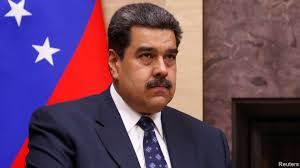In Venezuela, colectivo groups are armed shock groups in support of the government who seek to intimidate and displace anyone opposing the policies of the regime.
These armed groups have acted with impunity for more than a decade and under the protection of the authorities, affecting the human rights of many people in Venezuela.
The Human Rights Center of the Andrés Bello Catholic University (CDH Ucab) presented an investigation explaining the origin and rise to power of these paramilitary groups that have also become a cause for the forced migration of people from Venezuela.
The investigation carried out by the CDH Ucab team found cases of Venezuelan citizens who fled the country because of the actions of armed colectivo groups, and other instances of Venezuelan nationals who are now refugees or asylum seekers in countries such as Colombia, Ecuador, Peru and the United States as a result of this situation.
The CDH Ucab points out that international bodies such as the Fact-Finding Mission on Venezuela and the International Criminal Court studied cases of persecution by colectivo groups in which the victims had to leave the country.
“The report is based on the analysis of 25 cases that occurred between 2009 and 2021, some of which involve entire family groups fleeing Venezuela due to threats and attacks by armed colectivo groups,” the document reads.
The victims fled after the attacks
The report describes that the power of the armed colectivo groups as a parastatal force allows them to act with recklessness and impunity in subduing real or perceived opponents. The lack of will by the law enforcement agencies to check the action of armed colectivo groups leaves the victims in a situation of greatest vulnerability that forces them to leave the country.
The victims of these paramilitary groups have different profiles, but the report documented cases of high school and university students, professionals, merchants and businessmen.
“Most of the victims are men, although other members of their families were frequently affected by threats and other actions by the colectivo groups,” the document says.
These armed groups do not distinguish between age groups. The Human Rights Center found cases of teenagers victims of direct attacks or retaliation for the political activity of a member of their families.
The cases analyzed by the CDH Ucab took place in the Venezuelan states of Aragua, Bolívar, Carabobo, Falcón, Miranda, Monagas, Táchira, Zulia and the Capital District.
The motivations
In general, the motivations of the groups are of a political nature, which is also used to cover up their criminal actions.

“These are not criminal organizations in the style of organized crime gangs since they operate under the cover of political protection, invoking political motives in their actions and manifesting the rejection of their victims’ political views in different ways.”
More than half of the victims in the cases of intimidation and human rights violations investigated by the CDH Uca were initially identified as government opponents for their participation in protests; in some cases as promoters and organizers of demonstrations or even by attending them.
A retired teacher recounted how she was brutally attacked by colectivo groups “for protesting with a pencil and a banner”.
Another reason for attacks by armed colectivo groups is the support of opposition political parties, especially in the framework of parliamentary, regional, or national elections or the collection of signatures for a recall referendum.
“Criticism of the government or support for the opposition by merchants, farmers or businessmen is a reason to become the target of attacks that, in general, translate into extortion, theft of merchandise and attacks on businesses and workplaces,” the document reads.
Intimidation tactics
The investigation explains that the forms of intimidation used by these paramilitary groups include the detention of protesters by their own hands or to hand them over to security agencies; beatings, verbal attacks, threats, extortion, kidnapping, wounds by firearms, destruction or theft of property, attacks on homes or workplaces, torture, simulated execution, and enforced disappearance, among others.
“Victims often refer to patterns that describe a tactic of gradual and increasing pressure. Whenever the victim ignores the warnings, the pressure increases, ranging from threats to physical assaults and other measures that make them feel more vulnerable as they are approached at home or their workplace or reached by phone with personal information that includes their address, the names of their relatives or the school attended by their children, for example, ” the report adds.
The UCAB human rights center points out that armed colectivo groups often make use of graffiti to single out the people with a different political view. They marked their houses with their names or with the name of the political party.
“In one case, the friend of a victim was kidnapped and had his legs broken; he was later released with the message that he would be next. Another victim was shot in the legs and spent a year without being able to walk, ” the report says.
Victims flee
Most of the cases examined by the CDH Ucab covered attacks over several years, with peaks associated with times of greater social protest. The investigation showed that the relationship between the occurrence of an attack and the victim’s decision to leave the country is not immediate since the victims usually resist the first threats and only choose to leave when they intensify and become more serious.
“Internal displacement is frequently seen as an option before leaving the country since the victims believe that they will be safe once they leave the area where their aggressors operate. However, the fact that the armed colectivos groups have contact with the security forces, has in many cases allowed them to find the new whereabouts of their victims, who are forced to move again.
Find the full report in Spanish HERE.
Translated by José Rafael Medina




